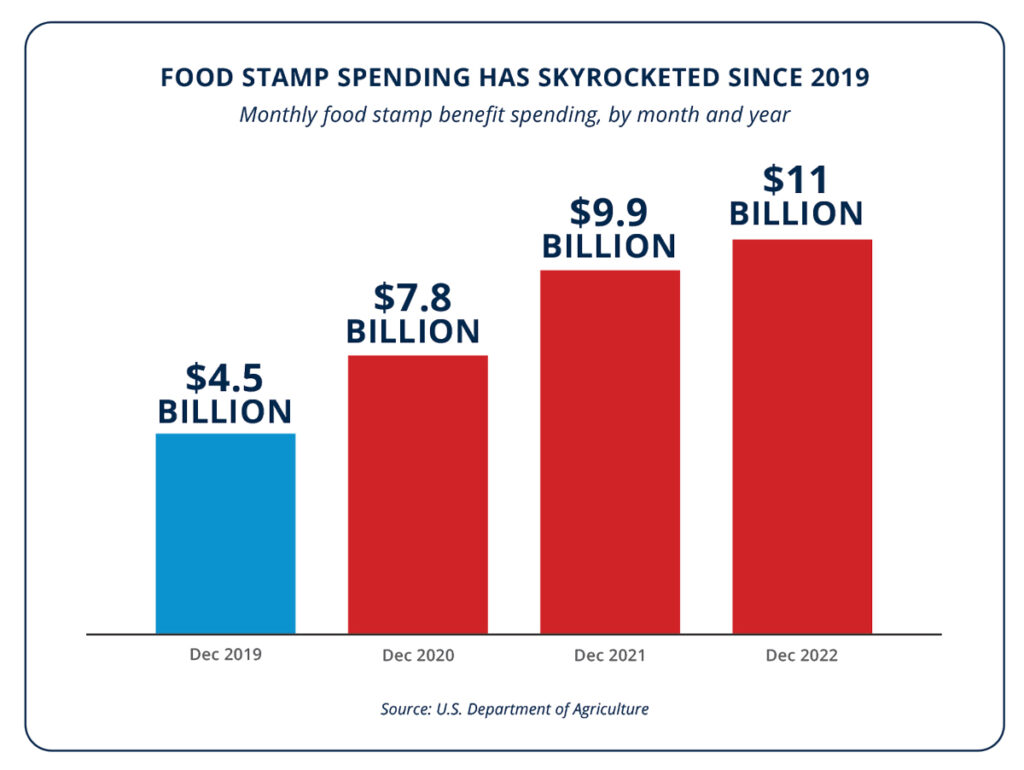Welfare Spending is Making Groceries More Expensive
- BY FGA
The exponentially increasing cost of living is set to be a major issue in the upcoming presidential election. But why wait for an election to address inflation when there are solutions available right now?
When it comes to groceries, one of the biggest driving forces behind rising prices is welfare, specifically food stamps. According to a new paper by the Foundation for Government Accountability, the dramatic increase in food stamp spending over the last few years is helping to drive grocery prices sky high.
Why is spending up?
As the paper notes, food stamp spending reached a record-high $119 billion in 2022, a sixfold increase over the last two decades, with the vast majority of that growth occurring in the last three years.
Most of this increase is a result of President Biden’s U.S. Department of Agriculture (USDA) rushing through a 27 percent hike in food stamp benefits in 2021—the largest permanent increase since the program was created. In doing so, USDA violated its own internal control standards, canceled peer-review processes, and ignored its own experts. The Biden administration’s unlawful food stamp expansion also completely bypassed Congress, and the Congressional Budget Office estimates that food stamp benefits will cost taxpayers a record-high $1.1 trillion over the next decade.

Thanks to all this spending, you’re paying more at the grocery store
Hundreds of billions of dollars in new spending on food stamps costs more than just the sticker price. It also contributes to higher inflation, leading to higher grocery prices for all.
Researchers at the World Bank found that food prices increase by one percent for every 12.5 percent increase in food stamp spending. Their study included 2.6 million barcodes with data from more than 20,000 stores, comprising roughly half of all sales at U.S. grocery stores.
There was a 23-24 percent increase in food prices from December 2019 to March 2023. Margarine went up 59 percent, egg prices by 54 percent, and frozen vegetables 36 percent since 2019. That is a huge difference, especially for families struggling to make ends meet.
The paper points out that food stamp spending could be responsible for at least two-thirds of that increase. After accounting for emergency allotments and pandemic EBT programs, total food stamp spending had nearly tripled since December 2019. This suggests food stamp spending increases fueled grocery price increases of more than 15 percent.
Can this be stopped?
Fortunately, yes! This year, Congress is working through the Farm Bill, major legislation that covers everything from agriculture policy to food stamps (mostly food stamps). This gives Congress the opportunity to implement significant reforms that can preserve resources for the truly needy while reducing waste, fraud, and abuse.
To stop this massive spending increase, Congress can repeal President Biden’s unlawful food stamp expansion and codify a statutory requirement that all Thrifty Food Plan reevaluations be cost neutral to prevent future bureaucrats from trying this again in the future. Rolling back this expansion, the paper concludes, could save taxpayers more than $193 billion over the next decade.
Congress can also require that bureaucrats receive congressional approval for all costly executive actions, not just those related to food stamps, before they’re allowed to take effect.
FGA research in the news
The Epoch Times: Food Stamp Spending Expansion Blamed for 15 Percent Grocery Price Inflation
Based Politics: One Biden policy made food prices go up by 15%, study finds
Breitbart: Report: Rising Food Costs Linked to Hike in Food Stamp Benefits
New York Post: Biden’s food stamp expansion linked to 15% jump in grocery prices: study
Fox News: Biden’s food stamp expansion linked to 15% jump in grocery prices, study says
